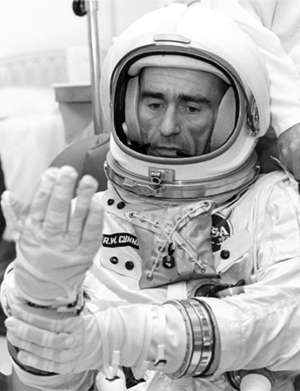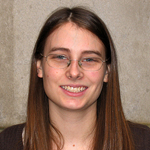Apollo Astronaut Walt Cunningham will present Washington University in St. Louis senior Kaitlin E. Burlingame with a $10,000 scholarship from the Astronaut Scholarship Foundation (ASF) during a public presentation and ceremony at 3 p.m. Thursday, Oct. 7, in Brookings Hall, Room 300, on the Danforth Campus.

Courtesy photo
Astronaut Walt Cunningham will present a $10,000 scholarship from the Astronaut Scholarship Foundation to WUSTL senior Kaitlin E. Burlingame.
The award ceremony will include a presentation by Cunningham, where he will share his experiences as Lunar Module Pilot for Apollo 7, the first manned Apollo mission. His lecture is free and open to the public.
Burlingame, who has taken a rigorous and demanding course of study, according to her adviser, is a mechanical engineering major in the School of Engineering & Applied Science.
Among her academic interests, she has worked with a team of students since her freshman year to design and build small satellites. For the nanosatellite project in the school’s Aerospace Systems Lab, her main task was integrating and testing each major system and then the overall satellite.
Becoming a key member of the team as the “flight operations lead,” she was responsible for planning each phase of the mission and the commands for that phase, and then making sure that the technology was in place to fulfill each step.
“Katie learned skills ranging from electrical soldering and metal machining to project management. She developed from a casual participant to … the driving force behind the project,” says Philip V. Bayly, PhD, the Lilyan and E. Lisle Hughes Professor of Mechanical Engineering, chair of the Department of Mechanical Engineering & Materials Science and her academic adviser. “She is an excellent team member, and clearly holds the respect and affection of the other students with whom she works.”
As an example of her initiative, she arranged her own independent study course at a research lab in Germany last summer. Among her extracurricular activities, she is a member of Alpha Phi Omega, a national co-ed community service fraternity.

Burlingame, from Longwood, Fla., is a Washington University Alexander S. Langsdorf Fellow and a McKelvey Undergraduate Research Scholar, as well as a NASA MUST (Motivating Undergraduates in Science and Technology Scholar). As a MUST scholar she attended a five-day symposium last year in Orlando, Fla., and the Kennedy Space Center and interned at the Johnson Space Center in Houston last summer, working on the new concept for the lunar rover.
She is working on a NASA education engineering program and plans to attend graduate school. Her goal is to combine her education and skills with the needs of society to bring about useful technical innovations.
“I don’t know which borders these innovations will be crossing, whether they’re finding new ways to test medicine in space, looking into advanced robotic mechanisms, or adapting a technology developed for space to applications back on the ground, but I’m confident that my education, drive and ability to focus on both the details and the big picture will lead me in the right direction,” Burlingame says.
“Ms. Burlingame is a remarkable young woman and I am honored to be presenting her with the Astronaut Scholarship award,” Cunningham says. “Her devotion to the field of mechanical engineering has convinced me that her future accomplishments will rival those of our most successful Astronaut Scholarship recipients.”
The Astronaut Scholarship is the largest monetary award given in the United States to science and engineering undergraduate students based solely on merit. Burlingame is one of 20 university students nationwide selected to receive this prestigious award.
Since 1986, $193,000 has been awarded to Washington University in St. Louis scholars, who are considered well-rounded students who exhibit motivation, imagination and intellectual daring, as well as exceptional performance, both in and out of the classroom.
Hall of Fame astronaut
Already a Marine and an experienced scientist, Cunningham was selected by NASA to become an astronaut in October 1963. On Oct. 11, 1968, Cunningham, Commander Walter Schirra, and Command Module Pilot Donn Eisele were launched aboard Apollo 7.
Cunningham served as Lunar Module Pilot and conducted tests and experiments during the 11-day Earth orbit mission. The 260-hour, 4 1/2-million-mile flight was a complete success and provided NASA with the confidence to send the next Apollo crew, Apollo 8, into orbit around the moon.
Cunningham was inducted into the U.S. Astronaut Hall of Fame on Oct. 4, 1997, and serves on ASF’s board of directors.
The ASF is a nonprofit organization established by the Mercury Astronauts in 1984. Its goal is to aid the United States in retaining its world leadership in science and technology by providing scholarships for exceptional college students pursuing degrees in these fields.
Today, more than 80 astronauts from the Gemini, Apollo, Skylab, Space Shuttle and Space Station programs have joined in this educational endeavor. For more information, visit AstronautScholarship.org.
For more information on the lecture, contact Jennifer Gibbs at jgibbs@wustl.edu or (314) 935-7003.